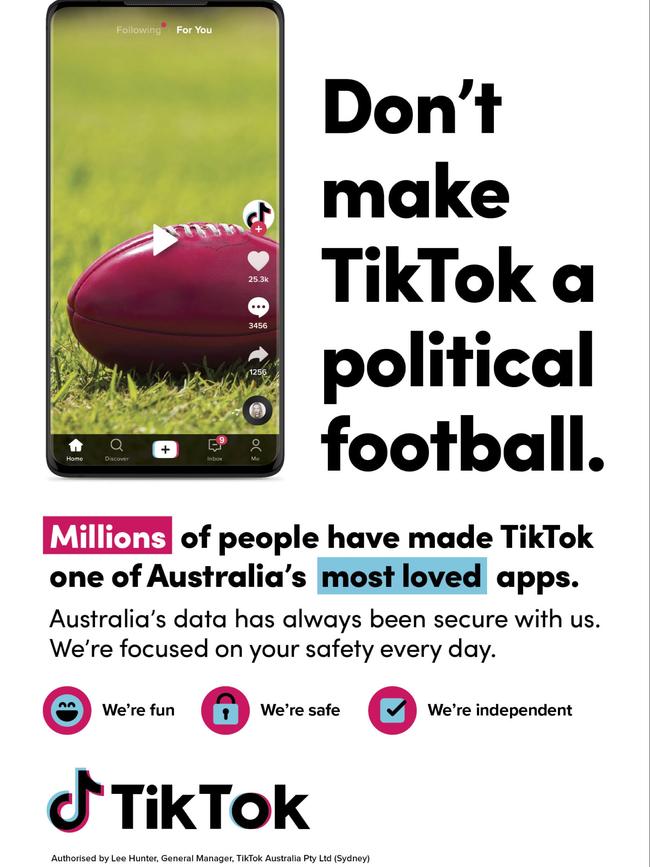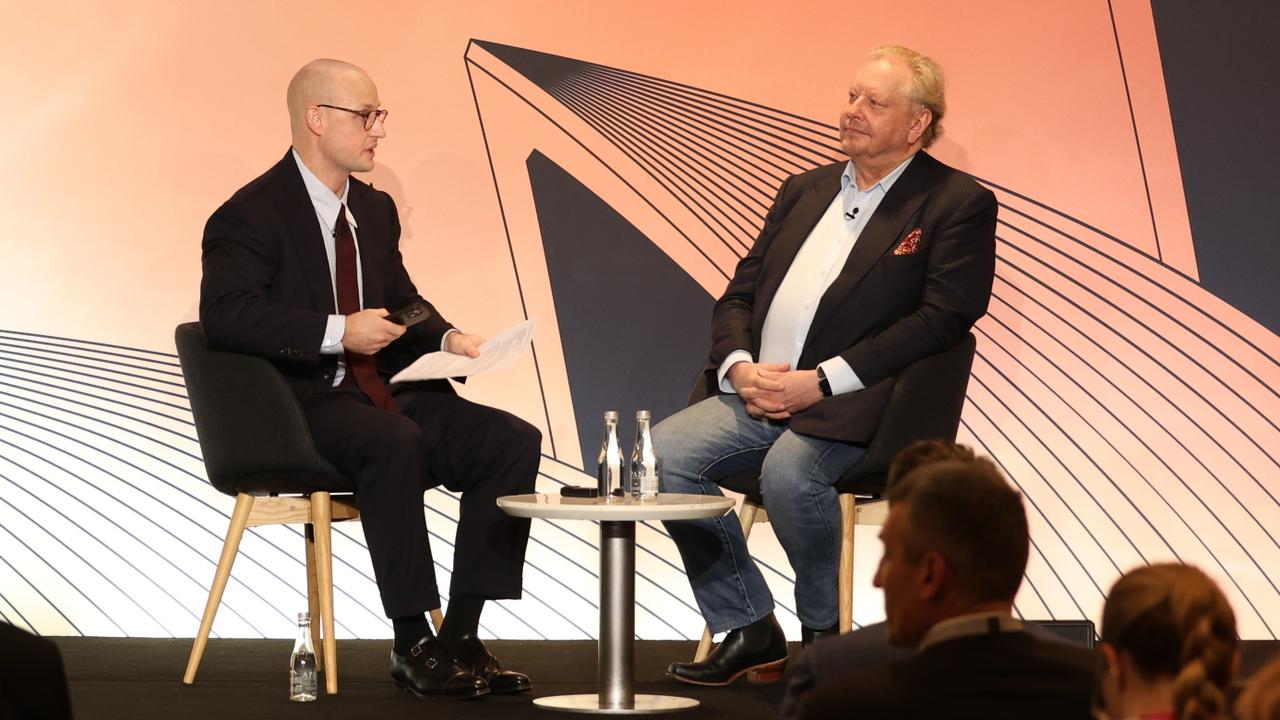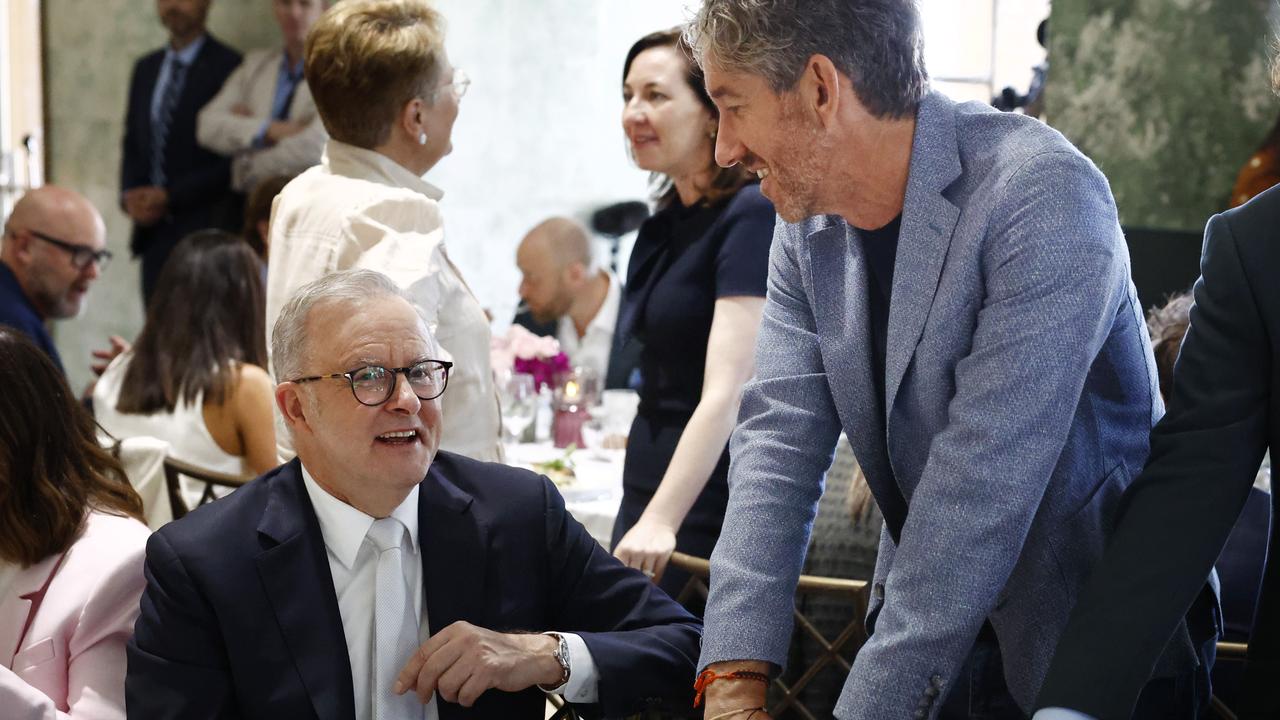Tiktok looks to revamp to sidestep proposed Australian ban
TikTok might consider a different corporate structure to avoid Chinese government influence and a ban in Australia and the US.

Embattled social video platform TikTok might consider a different corporate structure to avoid Chinese government influence and a ban in Australia and the US.
Speaking with The Australian, TikTok Australia general manager Lee Hunter said there were conversations going on at TikTok about how to build trust and changing the corporate structure was one option.
Mr Hunter said the short-format video platform would never under any circumstance share its data with any foreign government, including China’s government.
“There is no TikTok user data held in China, for Australians it‘s held in Singapore and the US,” Mr Hunter said. “The Chinese government doesn’t have any access to that data. And even if they requested it of us, we would never give it to them.”
For TikTok, its position as a company owned by Chinese multinational ByteDance is the elephant in the room. Despite TikTok’s intentions otherwise, China’s 2017 National Intelligence Law requires it to support China’s intelligence gathering activities.
Asked whether TikTok could spin off from ByteDance to avoid this law, Mr Hunter didn’t rule the option out.
“We‘re looking at a number of different options for us, all with the intent of making sure that we continue this amazing growth we’ve had, and that we do the best by the users, the creators and the partners that we have.
“If one of those scenarios is that we look at a different corporate structure, that‘s to the benefit of everyone concerned, I think we take that very seriously and I know that there’s a number of conversations going around at the moment about how best to continue to build on that trust and let users know that we are a safe platform that has their privacy at our highest concern.”
Ensuring TikTok escapes the fate of Huawei in Australia is at the top of his agenda. The musician and former Google/YouTube marketing/strategist has been thrust centre stage into the greatest crisis TikTok has faced – the threat to its continued existence.
TikTok is responding today by launching a large-scale media campaign in Australia to try to convince the public that they have nothing to fear from its link to ByteDance. Ads will run in print, digital outdoor and video platforms nationally and regionally for several weeks, with the slogan “Don’t Make TikTok a political football”.
Mr Hunter already has written to federal MPs to put his case. “Contrary to some claims, we are not aligned with any government, political party or ideology,” he says in the letter.
TikTok however faces headwinds. It has been banned in its largest market India where it has a reported 200 million users. Instagram is testing its TikTok-like video sharing platform Reels which aims to soak up the market void.

TikTok also recently exited the Hong Kong market after China passed its controversial security law.
Facebook, Google and Twitter announced they had stopped processing requests for data by Hong Kong law enforcement, but as a Chinese firm, it would have been virtually impossible for TikTok to resist law enforcement requests. Mr Hunter said TikTok would have been in an impossible position should it have stayed.
Parent ByteDance has very publicly backed down when confronted with concern by China authorities. In 2018, it apologised after China’s media regulators took issue with “vulgar” and “improper” content on its app Neihan Duanzi. The app was withdrawn.
Foreignpolicy.com reported that ByteDance founder Zhang Yiming had issued a letter stating that the app was “incommensurate with socialist core values” and promised the company would ”further deepen co-operation with authoritative [official party] media, elevating distribution of authoritative media content, ensuring that authoritative [official party] media voices are broadcast to strength.”
There have been other concerns. TikTok last month was among around 50 apps found to be copying information from users’ clipboards on Apple devices. TikTok chief information security officer Roland Cloutier said the company had accessed users clipboards to detect a SPAM problem where users were posting the same comments on hundreds of videos. TikTok discontinued the practice.
There are the damning claims of spyware in TikTok made by an anonymous poster on Reddit in April. “TikTok is a data collection service that is thinly-veiled as a social network. If there is an API to get information on you, your contacts, or your device... well, they‘re using it,” the poster says.
Reuters last week reported that the US Federal Trade Commission and the US Justice Department were looking into claims that TikTok failed to live up to a 2019 agreement aimed at protecting children’s privacy, according to two people interviewed by the agencies.
A TikTok spokesman said the company took “safety seriously for all our users”, adding that in the US they “accommodate users under 13 in a limited app experience that introduces additional safety and privacy protections designed specifically for a younger audience,” the Reuters report said.
Brisbane cyber lawyer Sandy Zhang said TikTok was no worse than other social media companies when it came to collecting user information, however its status as a Chinese company under ByteDance left it open to Chinese Communist Party (CCP) influence.
“Every Chinese company of a respectable size would have a department dedicated to relations with the government,” he said. “They’ll also almost certainly have some senior staff members who are connected to the CCP, or are themselves a party member with mostly superficial party duties.”
He said China’s government was unlikely to monitor personal information on a massive scale, even though it technically had the power to gain access to data from TikTok. However it would have a system that monitored data for specific things, such as banned keywords, images and videos.
“People who continuously share banned content would then be flagged and may be monitored more closely. They’re not likely interested in what you bought on eBay last week. However, in the case of prominent figures using TikTok, the concerns can become more serious.”
Mr Hunter says TikTok welcomes an ongoing discussion about its operation with Australian authorities and remained transparent in its dealings. He said TikTok had developed an online transparency centre and had published transparency reports so that policy makers and users could understand how the company operated.
In the end, it may require a drastic step such as reconstituting as a western company for TikTok to survive. While ByteDance is a Chinese multinational, the TikTok app doesn’t operate there, so such a move shouldn’t be discounted.
Maybe those locals in charge could take some inspiration from Nikolai and Pavel Durov, the founders of VKontakte, the Russian version of Facebook, who in 2014 refused continued requests by Russian security agencies for data on Ukrainian protesters during the Russian-Ukrainian conflict.
The pair’s next venture, the popular messaging service Telegram, shifted its operation from Russia to Germany, where it could escape Kremlin interference and offer encrypted messaging. Telegram continues to thrive, with a reported 400 million monthly active users as at April this year. Pavel Durov left Russia.



To join the conversation, please log in. Don't have an account? Register
Join the conversation, you are commenting as Logout